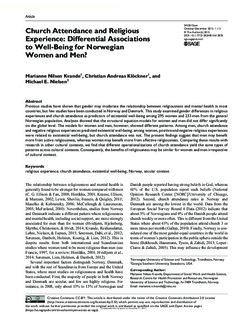Church Attendance and Religious Experience : Differential Associations to Well-Being for Norwegian Women and Men?
Journal article, Peer reviewed
Permanent lenke
http://hdl.handle.net/11250/2364456Utgivelsesdato
2015Metadata
Vis full innførselSamlinger
- Institutt for psykologi [3141]
- Institutt for sosialt arbeid [1393]
- Publikasjoner fra CRIStin - NTNU [38685]
Sammendrag
Previous studies have shown that gender may moderate the relationship between religiousness and mental health in most
countries, but few studies have been conducted in Norway and Denmark. This study examined gender differences in religious
experiences and church attendance as predictors of existential well-being among 295 women and 233 men from the general
Norwegian population. Analyses showed that the structural equation models for women and men did not differ significantly
on the global level. The models for women and men, however, showed different patterns. Among men, church attendance
and negative religious experiences predicted existential well-being; among women, positive and negative religious experiences
were related to existential well-being, but church attendance was not. The present findings suggest that men may benefit
more from active religiousness, whereas women may benefit more from affective religiousness. Comparing these results with
research in other cultural contexts, we find that different operationalizations of church attendance yield the same types of
patterns across cultural contexts. Consequently, the benefits of religiousness may be similar for women and men irrespective
of cultural context.
